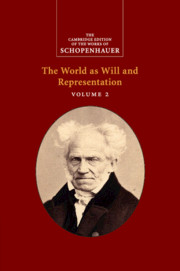Chapter 4 - On Cognition a Priori
Published online by Cambridge University Press: 30 June 2022
Summary
From the fact that we ourselves provide and determine the laws governing relations in space without requiring any experience to do so, Plato concluded (Meno, p. 353 Bipont) that all learning is mere recollection; Kant on the other hand concluded that space is subjectively conditioned and merely a form of the cognitive faculty. How far Kant towers above Plato in this respect!
Cogito, ergo sum is an analytic judgment: Parmenides even considered it an identical judgment: ‘because thinking and being are the same’ – Clement of Alexandria, Stromata VI, 2, § 23. But as an identical judgment, or even a merely analytic one,11 it can not contain any special wisdom; nor can it do so if, even more fundamentally, we want to derive it as a conclusion from themajor premise ‘thatwhich is not has no predicates’. But in fact Descartes wanted to use this judgment to express the great truth that immediate certainty can be attributed only to self-consciousness, which is to say, to the subjective; and that certainty about what is objective, which is to say everything else, is only indirect and must be mediated by what is subjective; and thus the objective must be regarded as problematic because it comes to us second hand. The value of his famous claim is based on this. In the spirit of the Kantian philosophy, we could propose its opposite as: cogito, ergo est – i.e. just as I think of things in certain relations (mathematical ones), they must always turn out in exactly that way in every possible experience, – this was an important, profound, and mature aperçu that appeared in the guise of the problem of the possibility of synthetic judgments a priori and truly prepared the way for profound discovery. This problem is the slogan of Kant's philosophy, just as the former claim is the slogan of Descartes’, and shows ‘from which to which’.
Very appropriately, Kant places his investigations into time and space ahead of all others, because these questions confront the speculative mind above all others:What is time?What is this being that consists of pure motion without anything that moves? – And what is space? – this omnipresent nothing from which no thing can escape without ceasing to be something?
- Type
- Chapter
- Information
- Schopenhauer: The World as Will and Representation , pp. 36 - 62Publisher: Cambridge University PressPrint publication year: 2018

